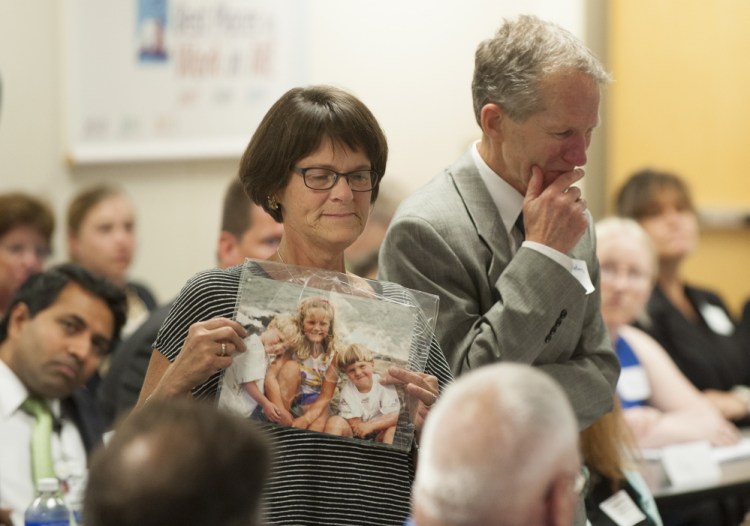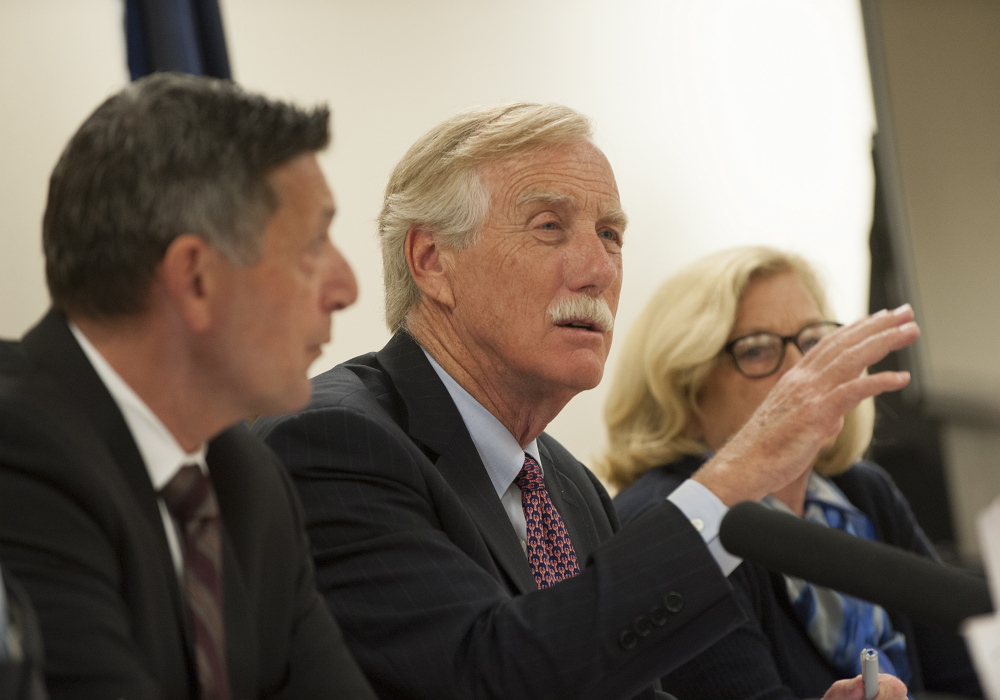BREWER — Lynn Ouellette has told her son’s story many times, but it still brings her to tears.
Brendan Keating repeatedly tried to shake his heroin addiction. He went on methadone, but relapsed. He was sent out of state for inpatient treatment, but relapsed.
He had two supportive parents, both doctors, who had the knowledge and the financial means to get him help, but it in the end, it couldn’t save him.
He died of an overdose in December 2013, just shy of his 23rd birthday.
Ouellette shared Brendan’s story, one that is becoming all too familiar, before a roomful of policy experts who gathered Tuesday in Brewer for a roundtable discussion on Maine’s growing drug problem. The event was hosted by Sen. Angus King of Maine and featured Michael Botticelli, director of the national Office of Drug Control Policy.
Much of the discussion centered on treatment: identifying what works and finding ways to expand access and increase funding.
But Ouellette, who paused at times to compose herself, said one of the simplest and most powerful things to do is keep talking about it.
“We need to talk about it,” she said as her husband, Thomas Keating, stood at her side. “We need to please avoid blame. Addiction, I’ve found, is an incredibly powerful force. It transcends every segment of society. We need to look at it as a public health issue.”
King, in his opening remarks, called Maine’s drug crisis an “epidemic” that needs a comprehensive approach to stop more people like Brendan Keating from dying.
“If this were a (tuberculosis) outbreak, we’d be turning ourselves upside down to fight it,” King, an independent senator and former two-term governor, said after Tuesday’s 2½-hour forum at Eastern Maine Healthcare in Brewer.
Maine’s drug problem has reached a critical juncture in recent months and is attracting attention from all corners.
Overdose deaths, particularly from heroin and its powerful synthetic cousin fentanyl, have reach record highs. In the first six months of this year, 34 people died from heroin overdoses, ahead of the pace set last year, when 57 died from heroin overdoses and 208 died from all drug overdoses.
King invited Botticelli, President Barack Obama’s top drug policy adviser, to the event to hear directly from Mainers about how the drug problem has affected communities here.
The message was clear: There isn’t enough treatment to meet demand, and there isn’t enough funding for the treatment options that do exist.
On Monday, a drug treatment clinic in Sanford that provides methadone announced that it will close because of a lack of government support, including cuts to MaineCare.
Botticelli said he has heard the same thing in other states. He supports expanding access to medication-assisted treatment using methadone and suboxone, and said the country will not arrest its way out of the drug crisis.
Some who spoke Tuesday mentioned a recent program, sponsored by the Gloucester Police Department in Massachusetts, that offers amnesty to low-level drug users if they agree to go into treatment.
Joel Merry, Sagadahoc County sheriff and president of the Maine Sheriffs Association, was glad that the Gloucester program was mentioned and said it could be an innovative approach in Maine.
U.S. Attorney Thomas Delahanty said such programs work only if police departments have enough partnerships with clinics to steer people toward treatment.
The overwhelming sentiment Tuesday was that more options are needed.
Maine Gov. Paul LePage also has seized on the need to address the growing drug problem, but has focused on getting drug dealers off the streets, rather than expanding treatment. The Republican governor is holding a summit Wednesday in Augusta, and the majority of the attendees will be law enforcement officials at the local, state and federal levels.
Delahanty, a former judge and one of the few people attending both events, said giving up on expanded law enforcement would be a mistake. But he said public safety officials can, and should, have more empathy for drug users, whose crimes are often directly linked to their addiction.
King and Rep. Chellie Pingree of Maine, a Democrat, said after Tuesday’s event that they are glad to see the governor taking action and hope that whatever comes out of Wednesday’s summit is complementary to the conversation they had on Tuesday.
After all, treatment doesn’t save everyone. Lynn Ouellette and Thomas Keating know that.
King sees Tuesday’s discussion as a beginning. He said funding is important, but “people being willing to stand up and put together a coalition makes a huge difference.”
Botticelli, in his closing remarks, said much work is needed to reduce the stigma of addiction and substance abuse.
“We really need to change our language,” he said. “When we refer to people as junkies – we don’t do that with other diseases. We’re stigmatizing even with the words we use.”
Botticelli and King said the most powerful voices in the ongoing discussion belong to people like Ouellette and Keating: parents and relatives who have lost loved ones to addiction and are willing to stand up and say so.
Like a growing number of families, Ouellette and Keating chose to reveal their son’s cause of death in his obituary. It’s part of breaking down the stigma, they said.
Andrew Kiezulas, who drove from Portland to address the participants at Tuesday’s forum, had the same feeling.
He said he could have been like Brendan Keating, but he’s now in recovery and uses every chance he gets to talk publicly about his addiction.
“More and more are speaking up and it’s really changing public perception of what we’re capable of,” he said.
Eric Russell can be contacted at 791-6344 or:
erussell@pressherald.com
Twitter: PPHEricRussell
Send questions/comments to the editors.



